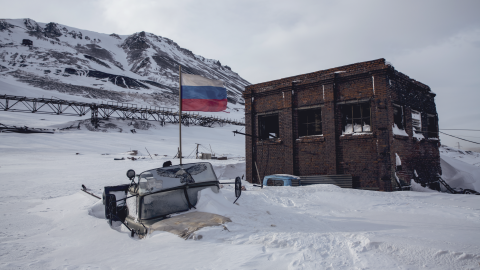With much of the world’s attention focused on US President Donald Trump’s historic visit to the Middle East or the fluctuating progress of talks between Russia and Ukraine, a quiet but consequential event took place last week that largely escaped notice.
In Norway, relatively low-level officials gathered for a closed-door ceremony to mark the transfer of the Arctic Council’s two-year rotating chairmanship from Norway to Denmark. This may seem mundane. In fact it was an important moment for one of the world’s few remaining forums where East and West, until recently, found ways to cooperate.
The council, established in 1996, brings together the eight Arctic states — Canada, Denmark (through Greenland), Finland, Iceland, Norway, Russia, Sweden, and the US — to collaborate on non-military issues. For years, it functioned effectively by focusing on practical, low-conflict areas such as environmental protection, search and rescue coordination, and oil spill response.
This pragmatic approach allowed the council to thrive, even during periods of broader geopolitical tension. Crucially, it also includes six indigenous organizations as permanent participants, giving the peoples who live in the Arctic a direct voice in shaping its future. Observer states, including faraway Singapore and major players such as China, contribute expertise and funding, but have no vote.
This system worked — until it didn’t.
The invasion of Ukraine by Russia in February 2022 shattered many channels of cooperation between Moscow and the West, including the Arctic Council. Although Russia handed over the chairmanship to Norway in May of that year, the customary fanfare was noticeably absent. Over the past two years Norway has tried to keep the council afloat, but the breakdown in relations with Russia rendered it largely ineffective. By the time Norway passed the chairmanship to Denmark, the best that could be said was that the council still existed.
Complicating matters further are suggestions by Trump that the US might seek to annex Greenland and an unwillingness to rule out military force to do so, which have alarmed NATO allies and unsettled the Arctic Council’s delicate balance. That may explain why it was Greenland’s foreign minister, rather than a Danish official, who accepted the chairmanship on Denmark’s behalf. How this tension between the US and Denmark plays out within the council remains to be seen, but it will not make cooperation any easier.
With the council unable to conduct substantial work, its immediate goal is simply to survive. Should a ceasefire or peace agreement be reached in Ukraine, some might push to quickly revive the council, but they would face serious headwinds. Since 2022, the Arctic security landscape has changed profoundly. Norway’s newly released national security strategy describes its situation as “the most serious ... our country has faced since the Second World War.”
What happens in the Arctic is often shaped by geopolitical currents elsewhere, and increasingly what happens in the Arctic has consequences across the globe.
Finland and Sweden, previously militarily non-aligned, have joined NATO, placing seven of the eight Arctic states under the same security umbrella. Their accession to the alliance would have been unimaginable before Russia’s invasion. The new Canadian government is expanding its presence in the Arctic, for geopolitical reasons that are unlikely to disappear anytime soon: Russia’s actions in Ukraine have left deep scars.
This evolving environment also affects non-Arctic states seeking a larger role in the region. China, for example, has been one of the major losers of the Arctic Council’s dysfunction. Beijing used the forum to expand influence in polar affairs. With the council no longer functioning as it once did, China has lost a key international venue. In response, Russia and China have deepened their cooperation in the Arctic, particularly on energy and infrastructure projects, driven partly by Western sanctions.
If the Arctic Council does eventually resume full operations, expect China to re-engage quickly to regain lost ground.
Another unresolved challenge concerns indigenous representation. Among the six permanent indigenous participants is the Russian Association of Indigenous Peoples of the North. However, many indigenous Russians have fled the country and formed exile organizations, such as the International Committee of Indigenous Peoples of Russia. These groups seek a seat at the Arctic Council table, but so far no effort has been made to include them. Moscow would undoubtedly veto any attempt to do so. If the council hopes to rebuild credibility, it cannot return to business as usual while excluding exiled indigenous voices. Navigating this will be tricky, but necessary.
Has the damage to trust between Russia and its Arctic neighbors gone too far for the council to recover? It’s too early to say, but it cannot be ruled out.
Also, that the Arctic is thousands of kilometers from the Middle East doesn’t mean it’s irrelevant to this region. With key shipping lanes in the Red Sea threatened by Houthi attacks and piracy concerns persisting off the Horn of Africa, global shipping companies are eyeing new trade routes between Asia and Europe. Depending on how rapidly Arctic ice continues to melt, northern sea routes may become increasingly viable.
Moreover, scientific research in the Arctic — especially on climate and environmental change — is of global importance. Countries such as the UAE and Saudi Arabia have already shown interest in Arctic research and investment. Both have sent delegations to Arctic conferences and expressed willingness to fund scientific initiatives. As the region becomes more accessible and geopolitically important, Arab engagement is likely to grow.
What happens in the Arctic is often shaped by geopolitical currents elsewhere, and increasingly what happens in the Arctic has consequences across the globe. While the headlines may focus on more immediate crises, the Arctic deserves attention. We ignore it at our peril.



















